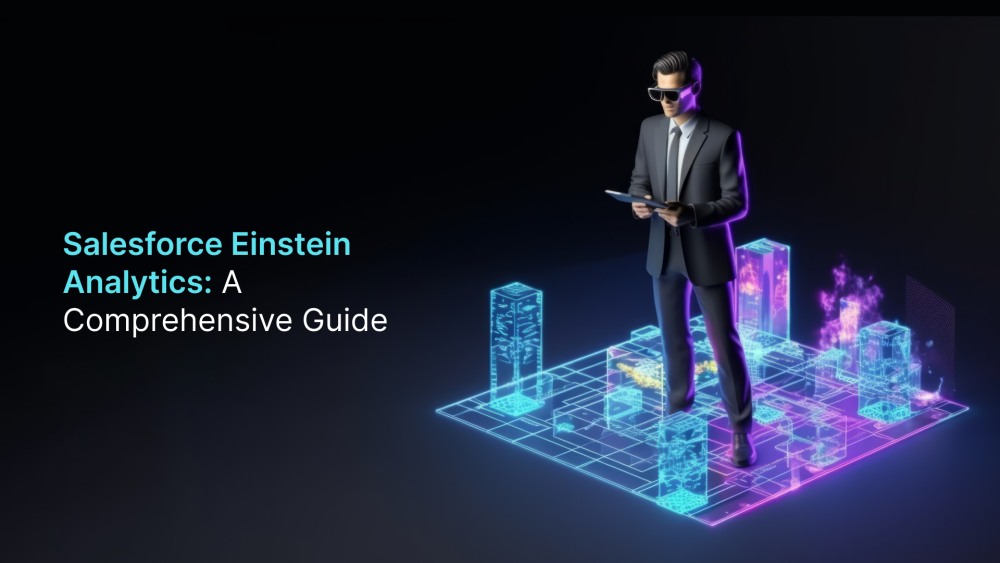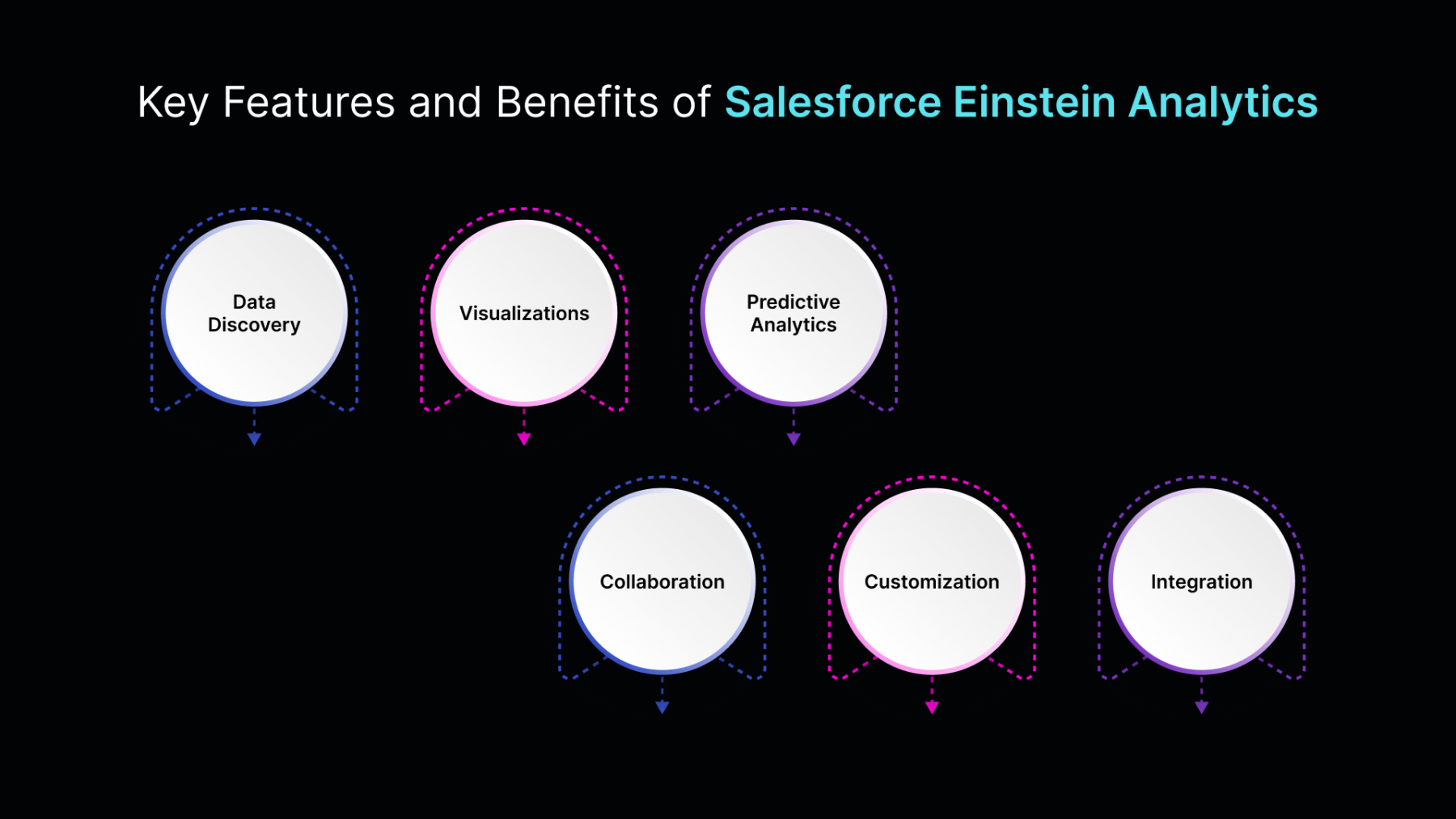Salesforce Einstein Analytics, formerly known as Salesforce Wave Analytics, is a powerful business intelligence (BI) platform embedded within the Salesforce CRM platform. It empowers businesses to leverage their Salesforce data to gain deeper customer insights, identify trends, and make data-driven decisions.
What is Salesforce Einstein Analytics?
Salesforce Einstein Analytics is a cloud-based BI solution that provides a comprehensive set of tools for data exploration, visualization, and analytics. It offers a user-friendly interface that enables business users to create interactive dashboards, reports, and insights without requiring extensive coding knowledge.
Key Features and Benefits of Salesforce Einstein Analytics
-
Data Discovery: Salesforce Einstein Analytics provides a variety of tools for data exploration, allowing users to uncover hidden patterns and trends within their Salesforce data.
-
Visualizations: It offers a rich library of pre-built and customizable dashboards and reports that enable users to visualize their data in an easy-to-understand format.
-
Predictive Analytics: Leveraging machine learning, Salesforce Einstein Analytics can generate predictive insights, helping businesses forecast future trends and make proactive decisions.
-
Collaboration: The platform fosters collaboration by allowing users to share dashboards and reports with colleagues, enabling teams to work together on data-driven initiatives.
-
Customization: Salesforce Einstein Analytics offers a high degree of customization, allowing businesses to tailor the platform to their specific needs and workflows.
-
Integration: It seamlessly integrates with other Salesforce products and services, providing a unified view of customer data.
Use Cases for Salesforce Einstein Analytics
Salesforce Einstein Analytics can be applied across various business functions to gain valuable insights. Here are some common use cases:
-
Sales: Sales teams can leverage Einstein Analytics to identify sales opportunities, track performance metrics, and predict customer churn.
-
Marketing: Marketers can use the platform to measure campaign effectiveness, understand customer behavior, and personalize marketing efforts.
-
Customer Service: Customer service teams can gain insights into customer sentiment, identify support trends, and improve customer satisfaction.
-
Operations: Businesses can utilize Einstein Analytics to optimize operational efficiency, identify areas for improvement, and make data-driven decisions.
Examples and Statistics
-
Salesforce reports that Einstein Analytics can generate include:
-
Sales pipeline analysis
-
Sales rep performance
-
Customer lifetime value
-
Win/loss analysis
-
A study by Gartner found that organizations that leverage BI platforms like Salesforce Einstein Analytics can achieve a 20% increase in sales productivity.
-
Another study by Forrester revealed that businesses that implement BI solutions see an average return on investment (ROI) of 371%.
Latest Tools and Technologies in Salesforce Einstein Analytics
Salesforce is constantly innovating and adding new features to Einstein Analytics. Here are some of the latest advancements:
-
Einstein Discovery: This AI-powered tool automatically analyzes data to uncover hidden insights and patterns.
-
Einstein Forecasting: This feature leverages machine learning to generate more accurate sales forecasts.
-
Einstein Analytics for Tableau: This integration allows users to leverage the familiar Tableau interface for data visualization within Salesforce Einstein Analytics.
-
Natural Language Processing (NLP): Salesforce Einstein Analytics is incorporating NLP capabilities, enabling users to interact with data using natural language queries.
Integration Process for Salesforce Einstein Analytics
Integrating Salesforce Einstein Analytics with your existing Salesforce instance is a relatively straightforward process. Here's a general overview:
-
Enable Einstein Analytics: In your Salesforce org, navigate to Setup and enable Einstein Analytics.
-
Connect Data Sources: Connect Einstein Analytics to your Salesforce data and any other relevant data sources.
-
Build Dashboards and Reports: Start creating dashboards and reports to visualize your data and gain insights.
-
Share and Collaborate: Share your dashboards and reports with colleagues to foster collaboration.
Benefits of Integrating Salesforce Einstein Analytics
-
Improved Decision-Making: By providing data-driven insights, Einstein Analytics empowers businesses to make more informed decisions.
-
Increased Efficiency: The platform streamlines data analysis processes, saving businesses time and resources.
-
Enhanced Collaboration: Einstein Analytics fosters collaboration by providing a central location for data sharing and insights.
-
Customer-Centric Approach: The platform enables businesses to gain a deeper understanding of their customers, leading to a more customer-centric approach.
Disadvantages of Salesforce Einstein Analytics
While Salesforce Einstein Analytics offers numerous advantages, there are also some limitations to consider:
-
Cost: Salesforce Einstein Analytics requires a separate license, which can add to your overall Salesforce costs.
-
Complexity: While the user interface is user-friendly for basic tasks, advanced functionalities may require some technical expertise.
-
Data Security: It's crucial to ensure proper data security measures are in place when integrating Einstein Analytics with external data sources.
Technical Details for Integration
Here's a more technical breakdown of the integration process:
-
Data Connection Methods: Salesforce Einstein Analytics supports various data connection methods, including native Salesforce data connections, OData, and JDBC.
-
Data Security Considerations: Define user permissions and data access controls to ensure data security when integrating external data sources.
-
Data Governance: Establish data governance practices to ensure data quality and consistency within Einstein Analytics.
Industry-Specific Use Cases
Salesforce Einstein Analytics offers tailored benefits across various industries:
-
Retail: Retailers can leverage Einstein Analytics to understand customer buying behavior, optimize pricing strategies, and personalize marketing campaigns.
-
Healthcare: Healthcare providers can utilize the platform to analyze patient data, improve care delivery, and identify potential health risks.
-
Financial Services: Financial institutions can use Einstein Analytics to assess financial risk, detect fraud, and gain insights into customer investment behavior.
Conclusion
Salesforce Einstein Analytics is a powerful BI platform that empowers businesses to leverage their data for actionable insights. Its user-friendly interface, rich features, and seamless integration with Salesforce make it a valuable tool for organizations of all sizes. By understanding the use cases, benefits, and limitations of Einstein Analytics, businesses can make an informed decision about whether it's the right solution for their needs.
Additional Tips
-
Start Small: Begin by focusing on a few key areas where Einstein Analytics can provide the most value.
-
Invest in Training: Provide proper training to users to ensure they can leverage the platform's full potential.
-
Embrace a Data-Driven Culture: Foster a culture of data-driven decision making within your organization



